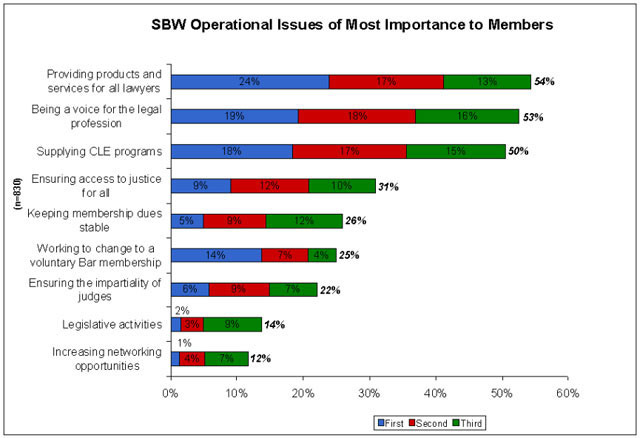March 4, 2009 – Fifty-seven percent of Wisconsin lawyers would likely vote for voluntary bar membership, according to the November 2008 Member Satisfaction Survey conducted by the State Bar of Wisconsin.
But members do not place the debate over voluntary bar membership high among the issues confronting the organization. Achieving voluntary bar membership is listed among the top three issues confronting the State Bar by just one in four lawyers, and only 14 percent consider it to be the most important issue. Providing products and services for all lawyers, being a voice for the legal profession, and supplying CLE programs were named as the three most pressing matters by at least one-half of members.
Moreover, if membership with the State Bar were voluntary, 71 percent would choose it. And among those who would vote for voluntary membership, more than half – 57 percent – would choose to remain a member. Roughly the same number of that subgroup – 55.8 percent – would likely recommend a fellow lawyer join if membership were no longer mandatory.
While the survey results show a foundation of support for the State Bar, they also reveal the work ahead for the organization. Whereas support for the State Bar is strongest among older members, law firm associates/partners, and those whose employer pays the dues, it is lower among government lawyers, younger lawyers, and those who personally pay their dues.
Madison-based marketing research firm Gene Kroupa & Associates conducted the survey after State Bar President Diane Diel appointed a 12-person Bar Membership Committee to study the question of voluntary membership. The Membership Committee is charged with studying the issue of compulsory membership in the context of members’ personal and professional needs and how the State Bar may best address them.

Getting their money’s worth
Nearly six in 10 (58 percent) of respondents personally pay the State Bar dues, while 42 percent said their employer pays the amount. Nonresidents, younger members, solo practitioners, those not practicing, and those in government agencies are more likely than their counterparts to pay the dues themselves.
Those who support voluntary State Bar membership are more likely to personally pay the membership dues than those who prefer mandatory participation (64 percent versus 48 percent). Still, just 26 percent of those who personally pay the dues would support a mandatory State Bar if their employer paid the State Bar’s portion of the fees.
For 2008-09, State Bar dues were $224 for active members, and the four court assessments totaled $216. The survey found that approximately 81 percent of members belong to at least one other professional association. Those who belong to other professional associations pay an average of $211, with a median of $180, per group in dues.
Overall, members feel that the State Bar provides comparable value as other professional associations, giving a mean rating of 3.2, with a median of 3.0, on a scale where 1 represents “much less value” and 5 represents “much greater value.”
Other observations
Respondents ranked “doing good work for clients” as their primary professional challenge. “Balancing work with private life,” “getting everything done,” and “getting business” were the next three issues named most by respondents.
When asked to name words or phrases to describe the State Bar’s value, CLEs were the top-cited item. CLE programming was also mentioned by respondents among the ways that the State Bar could strengthen its value.
The survey report remarked that awareness is high for most of the State Bar’s services, but non-residents and younger members were less likely to be aware of some key offerings. Fewer members were aware of online fillable practice forms (68 percent), law office management assistance program (65 percent), lawyer-to-lawyer dispute resolution service (62 percent), weekly e-mail of recent Wisconsin court decisions (57 percent), and civics education programs for youth (49 percent).
About the survey
The survey authors, Gene Kroupa & Associates, were charged with helping the State Bar better assess the aspects of membership important to lawyers and their level of satisfaction with efforts to meet their expectations.
A random sample of 3,000 resident and 2,000 nonresident members received a four-page questionnaire on Nov. 18, 2008. Responses were received through Dec. 22, 2008. A total of 920 questionnaires – 670 from residents and 250 from non-residents – amounted to an 18 percent response rate. Results had a confidence level of plus or minus 3.2 percentage points.
Still time to weigh in
The Bar Membership Committee is interested in hearing from members who want to comment on the results of this survey or share their thoughts about how the State Bar can better meet their needs. To provide feedback, post a comment on a discussion board or email a comment to the committee.
Alex De Grand is the legal writer for the State Bar of Wisconsin.
